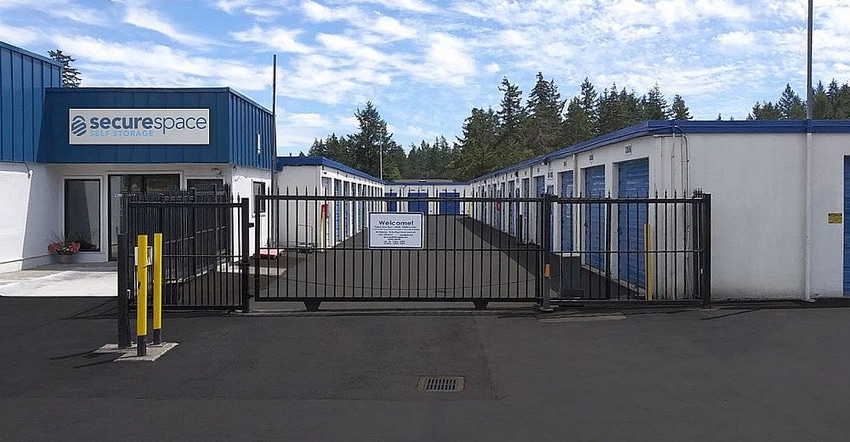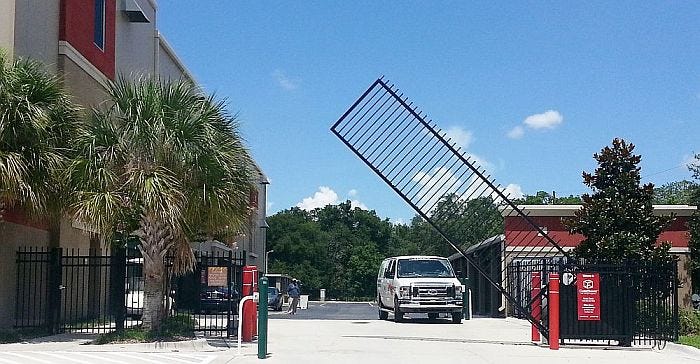Automatic gate systems are a common and essential part of a self-storage property. They not only provide safety and security but can add to facility curb appeal. However, there are many options on the market. Here’s some insight to choosing the right product.

An automatic gate system is used at a self-storage property to provide security, control vehicle movement and add customer convenience. It creates your facility’s primary entry and exit points, and establishes thoughtful, strong site access and tracking protocols. But not all systems are built alike. Your property might see RVs, rental trucks, trailers, employee vehicles, and a variety of other visitor traffic daily. Each facility is unique in the amount of flow and frequency of use, which puts various levels of demand on the security gate.
No matter who visits your facility or what they drive, the protection of your property and tenant stored goods is paramount. How do you design a gate system that’ll properly balance vehicle control, security and curb appeal, one that’ll look good and function well for many years? The following provides insight to these items as well as safety standards to consider.
Gate Overview
A gate system is comprised of several components including an operator that opens and closes the gate, the gate panel, supporting hardware, external devices designed to detect or prevent entrapment, vehicle-detection devices, and accessories such as lights. Many self-storage owners fall into the trap of thinking all systems are alike and any type will work on their property. But the fact is most are designed for a specific gate size, weight and rate of use.

The access gate at CubeSmart in Orlando, Florida
Often, the self-storage gate only becomes a priority when it fails, which can be a costly lesson to learn. In that moment, you may feel it’s less important to understand why the gate isn’t working than for someone to simply get it up and running. The temporary loss of security and customer satisfaction makes it more critical that the darn thing works! But only in knowing the root cause can you avoid the issue happening again. A malfunction can be due to many factors such as improper installation, deferred maintenance, or a faulty accessory or device.
While site security may help you rent more self-storage units and, therefore, generate more revenue, it still costs money. You need to know that the gate you buy will be safe, can perform well even in the cold and snow, won’t be a maintenance drain, and can keep up with heavy use. One thing you know for certain is that when it fails, it can be a serious imposition for you and your customers.
System Design
When you invest in a self-storage access gate, you’ll be stuck with your decision for many years to come, so you must put thought into the system design. Consider the quality and operational performance of each component. Ask yourself:
How will customers use your site and gate system?
Is there adequate space to put the access controls safely away from the gate?
Are there any fire-code requirements for a minimum gate size?
Are there any requirements for emergency-responder access?
What electrical and wiring do you need for the system components?
Is there space for all vehicles to enter and exit, with plenty of turning radius?
Will you include pedestrian doors or gates to avoid foot traffic going through the vehicular gate?
Will you be able to control who enters and exits your site by time and date?
Safety Standards
Another part of self-storage gate selection is following ASTM F2200 and Underwriters Laboratories (UL) 325 standards. There are general provisions for all automated gates and specific requirements for each type installed at any site. Gates are to be fabricated and installed unique to your property.
ASTM F2200 addresses automatic-gate construction and safety, addressing items such as fall-over protection, guarding and screening requirements, gaps and spacing requirements, and more. The gate operator must be tested and listed to and UL 325, which addresses the safety of the operator and any accessories wired to it. It defines the use of entrapment-protection devices such as photo eyes, requirements for qualitative manufacturer installation manuals, electrical requirements, access-control proximity to the gate system, and many other necessities.
Unfortunately, most gate installers fail to follow these standards or are simply unaware of how they apply to their work. This leads to countless instances of gate and vehicle damage and, tragically, pedestrian injury and death every year. The cost and liability can be addressed by selecting a quality product and good installer.
Automatic gate systems provide a great deal of security and convenience for self-storage facilities. Thoughtful planning and design will add value to your property and promote an efficient, well-operating system for many years. Cutting corners and being unaware of the hazards of a poorly designed system can be very frustrating or, worse, lead to injury or death and related liability. Always consult with and hire a trained and certified gate professional to help you choose the right product for your site.
Brian Fritz is general manager of AutoGate Inc., a provider of gate systems. He has experience in the perimeter- and physical-security industry, and holds positions on industry-standards committees. He’s the integrator of the AutoGate Corporate Business Operating System. For more information, call 419.588.1051 or email [email protected].
About the Author(s)
You May Also Like





